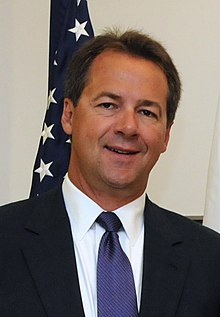Steve Bullock: Can a small-town liberal make it to the Oval Office?

The Democratic field for the 2020 presidential elections is already teeming with prospective nominees. Twenty-three of them, in fact. Look a little more closely at the list of (mostly) older white men, and you might recognize one of them: Montana’s very own Steve Bullock! Bullock has been the Democratic governor of Montana since 2013, not a small feat in a red state where Trump won by 56%. He announced his bid for the nomination on May 14th, but how does his political record in Montana help him stack up against other candidates?
One of Bullock’s greatest claims to fame is that he is a liberal leader in a majority Republican state. This points to an ability to appeal to centrist voters, something which may be a message the Democratic Party would support in face of an increasingly polarized and divided nation. In his campaign video, he highlights his bipartisan efforts to ban large corporations’ money from state politics, as well as working with Republicans to pass bills supporting Medicaid expansion. If the Party feels that this type of candidate would be their best chance at winning the elections, Bullock might be the right guy.
However, this averageness and desire to compromise might also be a weakness this presidential election. With younger generations of political activists making clear their support for more radical policies such as the Green New Deal and more diverse representation in politics, another older white man might not be the rallying figure needed to defeat Trump.
Although Bullock has supported many prominent issues on the liberal agenda, such as abortion rights, healthcare expansion, and combating climate change, he has not taken as strong of stances on the issues as other Democrats. As recently as 2016, the governor has rejected universal background checks on gun sales and promoted Montana’s 2nd Amendment Rights (admittedly, probably a necessary move for any politician in a rural, Republican state). Additionally, he has warned against a rapid move away from fossil fuels, an idea becoming less popular as younger Democrats push for big policy change to combat climate change.
The largest hurdle in Bullock’s path to the nomination is most likely his invisibility on the political stage. His late start into the race, along with his fairly small following of Montana Democrats, means that he has a lot of catching up to do to bigger name Democrats already heavily invested in the race.
Like any candidate, Bullock has traits and a record that are an advantage, as well as ones that disadvantage him. As the first Montana politician to run for president, however, he’s already making history.
